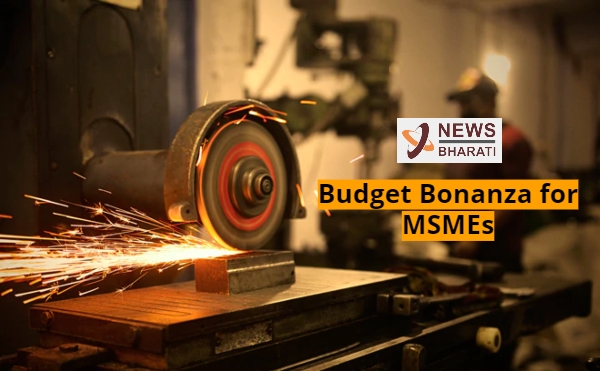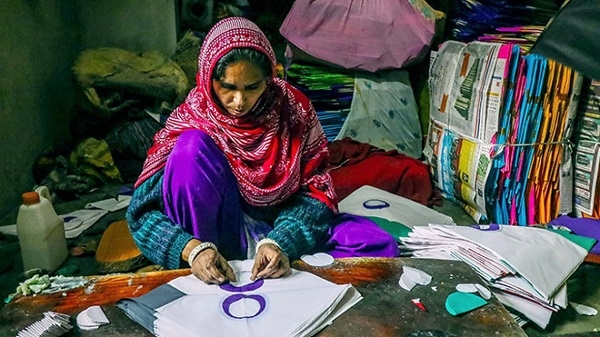The Budget Bonanza for MSMEs
Total Views |
Budget for 2021 -22 is presented in most unprecedented circumstances like never before in Independent India. The COVID -19 has affected not only India but the entire world encompassing all walks of life. There were apprehensions in the minds of supporters as well as opponents of government that the new taxes will be proposed. The Government has turned the challenges into opportunities and made visionary budget to mark a beginning for Indian Economy to regain its lost supremacy. And to achieve this goal a well defined road map has been drawn for ailing MSME sector by recognising their important role in the Indian Economy. Let us analyze the budget from the point of view of MSMEs.

1. Allocation-
The budget has provided Rs 15,700 crore for MSME sector in the Union Budget 2021-22 which is more than double of the previous year allocation of Rs.7575 crores for 2020-21.
It may be pointed out that the government had announced various schemes for revival of MSMEs which are facing stress due to COVID-19 and several MSMEs have benefited from it. Among the other segments, entrepreneurship and skill development programmes for the MSMEs would witness higher allocation. Further, the government has proposed to allocate ₹300 crore towards the establishment of new technology centres for the MSME units.
2. Production Linked Incentive scheme (PLI)
In order to promote AtmaNirbhar Bharat program by incentivising manufacturing sector a Production Linked Incentive scheme (PLI) has been launched. This will help manufacturing companies to become an integral part of global supply chains, by acquiring core competence and cutting-edge technology. To achieve this PLI schemes to create manufacturing global champions for an Atma Nirbhar Bharat have been announced for 13 sectors. For this, the government has committed nearly Rs.1.97 lakh crores, over 5 years starting FY 2021-22. This initiative will help bring scale and size in key sectors, create and nurture global champions and provide jobs to our youth.
3. Relief and New Vistas for MSMEs-
MSMEs and other user industries have been severely hit by a recent sharp rise in iron and steel prices. The budget has reduced Customs duty uniformly to 7.5% on semis, flat, and long products of non-alloy, alloy, and stainless steels. The custom duty on steel scrap for a period up to 31st March, 2022 has been exempted which will provide relief to metal re-cyclers which are mostly MSMEs. The vehicle scrapping policy will open new vistas for MSMEs.
4. Making MSME Products more competitive
In order to provide level playing field for local MSMEs the Budget has increased duty from 10% to 15% on steel screws and plastic builder wares, on prawn feed from 5% to 15%. Budget has also rationalised exemption on import of duty-free items as an incentive to exporters of garments, leather, and handicraft items. Almost all these items are made domestically by MSMEs. It has also withdrawn exemption on imports of certain kind of leathers as they are domestically produced in good quantity and quality, mostly by MSMEs. The custom duty on synthetic gem stones has also been increased to encourage their domestic processing.

5. Promoting Agro Processing MSMEs
The customs duty on cottonhas been raised from nil to 10% and on raw silk and silk yarn from 10% to 15%. The concession on end use based denatured ethyl alcohol has been withdrawn. Currently, rates are being uniformly calibrated to 15% on items like maize bran, rice bran oil cake, and animal feed additives. This will not only benefit Agro Processing MSMEs but will increase the income of farmers also.
6. Cascading effect of investment in Infrastructure Projects
A new centrally sponsored scheme, PM Atma Nirbhar Swasth Bharat Yojana, will be launched with an outlay of about Rs 64,180 crores over 6 years. The Budget outlay for Health and Wellbeing is Rs 2,23,846 crores in BE 2021-22 as against this year’s BE of Rs 94,452 crores an increase of 137%. The Jal Jeevan Mission (Urban), will be launched. It will be implemented over 5 years, with an outlay of Rs. 2,87,000 crores. The Urban Swachh Bharat Mission 2.0 will be implemented with a total financial allocation of Rs1,41,678 crores over a period of 5 years from 2021-2026. The enhanced outlay of Rs.1,18,101 lakh crores for Ministry of Road Transport and Highways, of which Rs.1,08,230 crores is for capital expenditure, the highest ever. A record sum of Rs 1,10,055 crores has been provided for Railways of which Rs.1,07,100 crores is for capital expenditure. More than Rs 85,000 Crores have provided for development of Metro Projects.
This has been proved time and again that incremental allocation for infrastructure creates cascading positive effect on MSMEs as most of these projects source locally made products. However Skilled and trained manpower is one of the important factors for this. Realignment of National Apprenticeship Training Scheme (NATS) for providing post education apprenticeship, training of graduates and diploma holders in Engineering will pave the way for manpower requirement of the MSME manufacturing sector.
7. Regulatory Measures
The budget proposes the creation of Asset Reconstruction Company Limited (ARCs) and Asset Management Company (AMCs) for consolidation and takeover of the existing stressed debt. The ARCs will ensure the monetization of these acquired assets with stressed debt. This will eliminate the poorer assets from the bank books, enhance lending and enable the banks to focus on the actual viability of MSME projects. Limit for Tax Audit enhanced from Rs.5 crore to Rs. 10 crore thereby providing relief from compliance burden to a large section of MSMEs.
Reopening of IT assessment cannot be done up to a time frame of 3 years instead of the previous 6 years. Only in case of serious tax evasion cases (above Rs 50 Lakh) the case can be reopened up to 10 years. This will increase certainty for small industries in case of past assessments and bring down litigation. Faceless Dispute Resolution Committee for small taxpayers with a taxable income of up to Rs. 50 lakh and any disputed income of ¬10 lakh. This will reduce existing litigation and prevent new disputes by settling the issue at the initial stage.
ALSO READ- Defence sector after 110 minutes of Budget 2021-22!
8. Debt Resolution-
But the biggest announcement is the creation of a special framework for MSMEs for debt resolution. Even though the details of the framework are awaited but it is certainly a move in the right direction as it will remove unnecessary litigation and bottlenecks for stressed MSMEs. Overall this budget will certainly provide a conducive atmosphere for development of MSMEs and prepare them for global competition so that they can rightfully contribute for the dream of 5 trillion dollar economy.
(The author is a freelance columnist on Banking & Finance)
.
.
